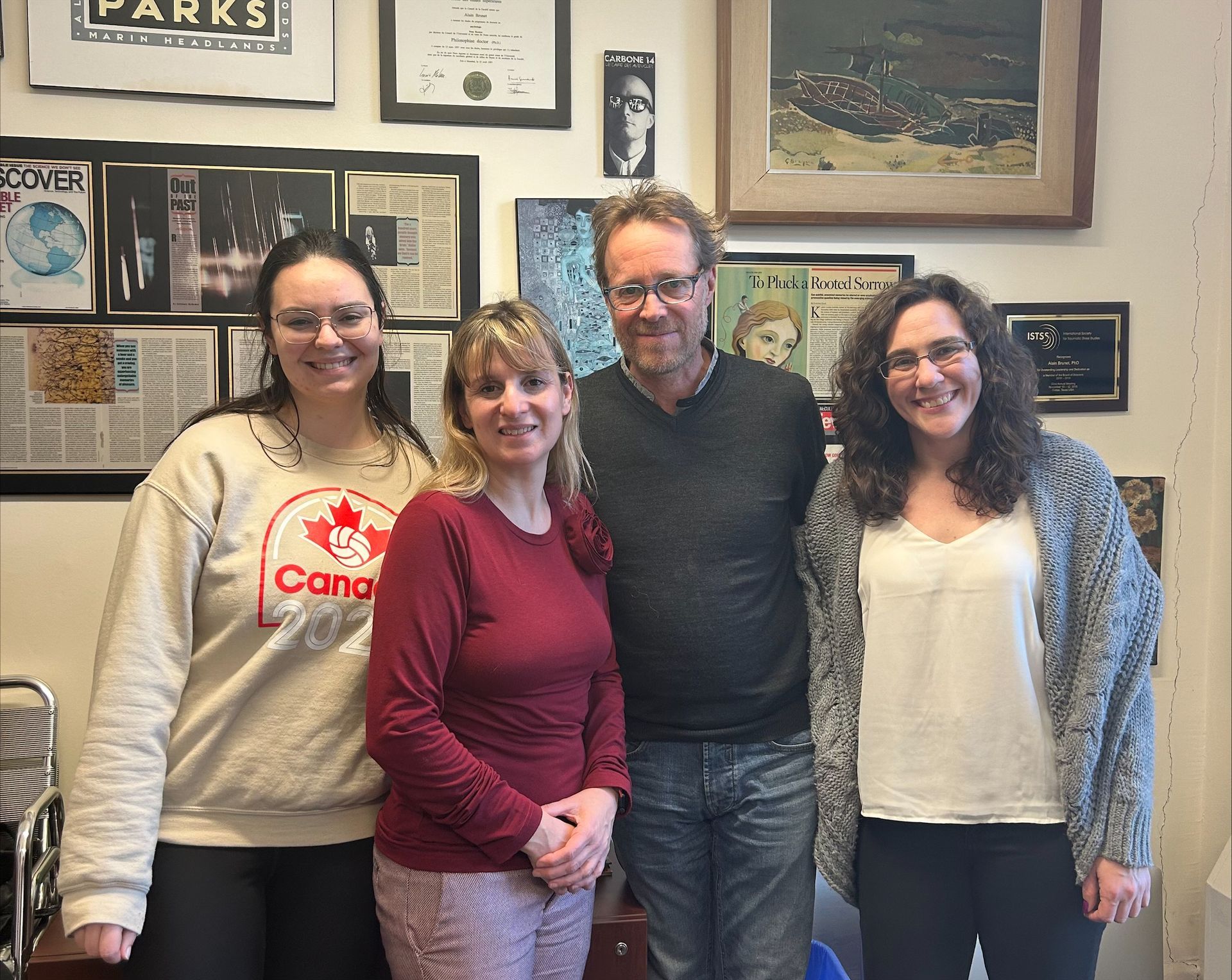Memory Reconsolidation TherapyTM: changing your life after post-traumatic stress disorder
Since September 2023, Reconsolidation TherapyTM is offered to Montfort’s emergency room patients who are experiencing symptoms of post-traumatic stress disorder (PTSD) or who are at risk of being affected by it. The aim is to match these clients with appropriate and free mental health services through the Access MHA platform before they leave Montfort’s emergency department.
This new service is the result of a collaborative initiative of Archipel’s Mental Health and Addictions (MHA) working group. The multisectoral group brings together client partners, the Eastern Ottawa community family health team, Centre médical Sainte-Anne, Montfort Renaissance, Ottawa Salus, Le CAP and Hôpital Montfort to find ways to reduce recurrent consultations for mental health reasons in emergency departments, while better helping people in need.
“When we shared and analyzed our data on the causes of recurrent consultations, we realized that most patients had symptoms of post-traumatic stress. And many didn’t have a family doctor or simply couldn’t afford to pay for private psychotherapy. So, we had to find a solution to care for these patients more effectively. Because the symptoms of post-traumatic stress disorder, such as depression and anxiety, have a major impact on the daily lives of these people,” explains Dr. Nadine Ostiguy, a family physician with the Eastern Ottawa Community Family Health Team.
Some of the clinicians in the group had already been trained in and successfully used the Reconsolidation TherapyTM. As such, it was the solution chosen by the Archipel MHA group, who helped train a dozen health professionals in the use of this form of psychotherapy.
What is Reconsolidation TherapyTM?
Developed in Montreal by Alain Brunet, Reconsolidation TherapyTM is an innovative approach that treats post-traumatic stress disorder by influencing the reconsolidation of memories associated with an intense emotional shock such as an assault, accident, terrorist attack or natural disaster.
Five to six sessions of psychotherapy combined with the use of a drug, propranolol, can have a beneficial effect on patients by reducing the emotional charge associated with the traumatic memory as well as the intensity of their symptoms.

Photo : Dr Brunet’s team: Marjolaine Rivest-Beauregard, PhD candidate, project coordinator; Manuela Ferrari, PhD, co-investigator; Alain Brunet, PhD, primary investigator; Michelle Lonergan, PhD, collaborating researcher.
How does memory Reconsolidation TherapyTM work?
At the first session, the patient fills out a questionnaire on the intensity of their symptoms and recent difficulties related to the traumatic event. The questionnaire score will be used to measure changes in their condition over the following weeks. The patient then takes propranolol, a short-lasting effect drug, and writes a narrative of the traumatic event in their own words. This difficult task makes the patient relive emotions and physical sensations.
The drug plays a role in reencoding the emotional charge of the memory in the long-term memory. The patient does not forget the memory but can dissociate the overwhelming emotions that accompany it. During subsequent visits, the patient takes propranolol again, reads the story aloud and fills out the questionnaire again. According to a study published in 2018**, most patients treated with Reconsolidation TherapyTM experience a significant reduction in their PTSD symptoms.
Compelling testimonies
“Now I move forward with my life. I no longer have those visions that used to come out of nowhere and haunt me, and I can think back on the event without becoming emotionally dysregulated. I can look at that as a sad story that is part of my life, but like a sad story in a book, I can choose to put the book down and get on with life.”
Maria’s story: surviving the trauma of deep mourning
During the course of one year over the pandemic, Maria* lost four members of her family, including one person who was her best friend. “I was extremely anxious and scared of death. It was impossible to think about tomorrow because I was so afraid of dying. I couldn’t say my friend’s name, plan my day or anything else. I was in distress and I really needed help.” The therapy enabled her to take a pause and calmly express her emotions. A year later, Maria’s brother was dying. “I was able to visit him in palliative care. The therapy had given me a basis for managing my stress, preparing myself for another bereavement and understanding that I needed to take care of myself. It was very beneficial.”
Dale Kajuka, a social worker with the Prisme Program at the Centre médical Ste-Anne in Ottawa, helped Maria. “This therapy works very well. It’s simple, practical and beneficial for clients. We’ve helped around 20 people with this approach, including Maria. By reducing the intensity of emotions associated with a painful memory, the person can heal more quickly and become more resistant to distress. This form of therapy should be more widely known.”
Peter’s story: freeing himself from the memories of war
Peter*, a veteran scarred by several combat experiences and struggling with chronic and severe symptoms of PTSD, underwent reconsolidation therapy. “My reality has changed: it’s like space has been freed up inside of me. It’s like I can focus on rediscovering who I am now that I don’t constantly feel tense, and on the lookout for threats around me. I don’t react to everything around me anymore.”
Peter was treated by Dr. Jean Grenier, a clinical psychologist and senior researcher at Carrefour santé Aline-Chrétien. Dr. Grenier has been treating patients with PTSD for more than 20 years, and Peter was his first patient to be treated with reconsolidation therapy. “I had been seeing Peter for almost a year before starting the propranolol therapy. At his first session, the score of his traumatic event impact form was quite high and reading his story was excruciating. But each week, the intensity of his distress diminished. And at the last session, everything had changed. In 20 years, I had never witnessed anyone cry with joy because they had finally overcome the distress caused by a traumatic event. This clinical experience was nothing short of impressive, both from the patient’s perspective and mine.”
Peter continued to see Dr. Grenier for some time, and a year after completing reconsolidation therapy, Peter is still feeling the benefits. “Now I move forward with my life. I no longer have those visions that used to come out of nowhere and haunt me, and I can think back on the event without becoming emotionally dysregulated. I can look at that as a sad story that is part of my life, but like a sad story in a book, I can choose to put the book down and get on with life.”
How to refer a patient or access this service?
At the Emergency Department of the Hôpital Montfort, staff can help patients with symptoms of PTSD to fill out the request form on the AccessMHA platform and get an appointment with a healthcare professional trained in reconsolidation therapy. A physician must assess the patient’s health condition before prescribing the medication. Consultations are free of charge.
AccessMHA is a bilingual digital platform that helps identify and access appropriate mental health and addiction services in Ontario: www.accessmha.ca.
*Names have been changed to protect the privacy of individuals.
** Brunet A, Saumier D, Liu A, Streiner DL, Tremblay J, Pitman RK. Reduction of PTSD Symptoms With Pre-Reactivation Propranolol Therapy: A Randomized Controlled Trial. Am J Psychiatry. 2018 May 1;175(5):427-433. doi: 10.1176/appi.ajp.2017.17050481. Epub 2018 Jan 12. PMID: 29325446.






